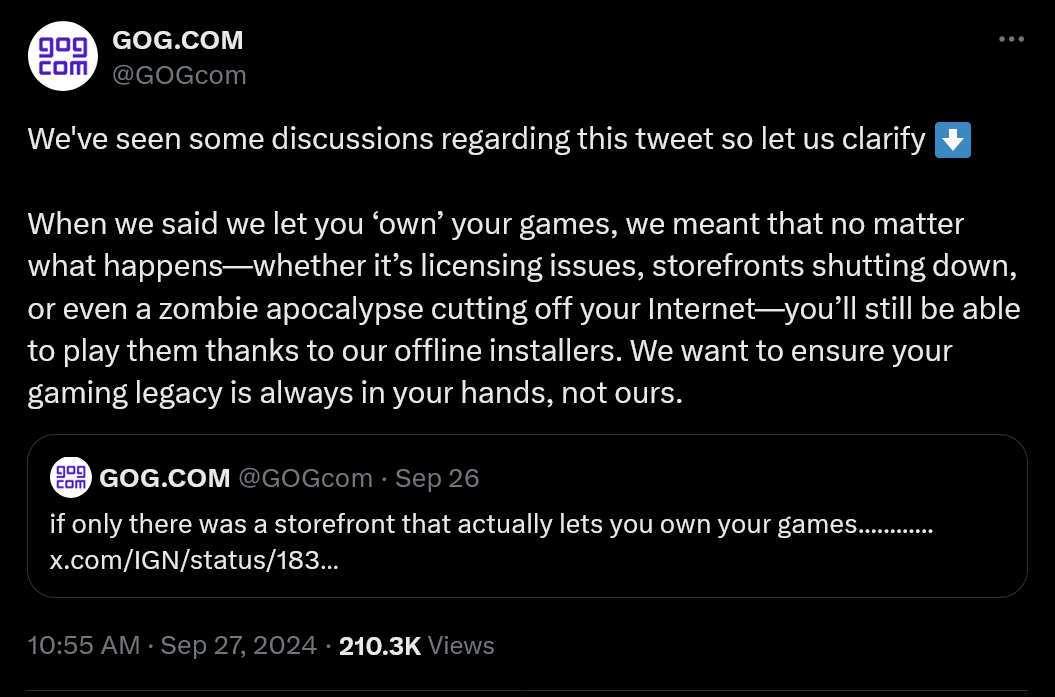New California law inspired by Ubisoft and Sony requires retailers to warn consumers that the digital games they buy can be taken away at any time
It won't stop your games from being taken away, but at least you won't be able to say you weren't warned.

A new California law set to come into effect in 2025 will make it illegal for sellers to use terms like "buy" or "purchase" in relation to digital goods—movies, books, and of course videogames—unless they provide a "clear and conspicuous" warning to consumers that those goods could be taken away from them at any time.
The law, AB 2426, essentially expands upon existing laws against false advertising by restricting the use of any terms "which a reasonable person would understand to confer an unrestricted ownership." To ensure people understand that digital ownership isn't really ownership, sellers will need to either receive "an affirmative acknowledgment from the purchaser" at the time of transaction, or—and this is obviously the more practical approach—put a warning, "in a manner that clearly calls attention to the language," on relevant products.
Assemblymember Jacqui Irwin, the sponsor of the bill, told Game File she was initially prompted to take action by Sony's planned removal of Discovery content from the PlayStation store because of expiring licenses. Not only would the shows no longer be available for purchase, but those who had already purchased them would lose access. Sony eventually reversed the decision, but the damage was done: Irwin introduced the bill in February.
Two months later, Ubisoft helped convince her it was the right move when it started revoking licenses for the racing game The Crew. Sales of The Crew had already been halted in December 2023, but the game—including its singleplayer portion—was dependent on remote servers, and those went offline in April. That rendered the game unplayable even for those who already owned it, but Ubisoft apparently wanted to be sure nobody whipped up a DIY option to get the game running again.
"Ubisoft's actions with The Crew further highlighted just how widespread this issue is," Irwin said.
The text of the new law is dense and dull, as these things tend to be, but the bottom line is that vendors in California will not be legally allowed to use conventional "buy my stuff" verbiage with regard to digital products unless certain conditions are met:
- The aforementioned "affirmative acknowledgement" at each transaction, or the "clear and conspicuous" warning
- The digital product in question is free
- The digital product offers a "permanent offline download to an external storage source to be used without a connection to the internet
That last point is the one most meaningful to gamers. The presence of a warning label is all well and good, but it still leaves open the possibility that a game with an online component can be yoinked away at any time with no real recourse for those who paid for them. The presence of a proper offline mode, on the other hand, means we can keep on playing even after the remote servers are taken offline, which is a far better outcome than simply being told, "Hey, you were warned."
The biggest gaming news, reviews and hardware deals
Keep up to date with the most important stories and the best deals, as picked by the PC Gamer team.
That's the approach Ubisoft is taking with newer games in The Crew series. After the debacle of The Crew takedown, Ubisoft promised to add offline modes to The Crew 2 and The Crew Motorfest "to ensure long term access to both titles." Multiplayer-only games won't have that option, of course, but if they're free to play they'll be exempt from the new law anyway.
Never one to miss an opportunity to remind gamers of its raison d’être, digital storefront GOG waded in to "clarify" its position on the matter.

"When we said we let you 'own' your games, we meant that no matter what happens—whether it's licensing issues, storefronts shutting down, or even a zombie apocalypse cutting off your Internet—you'll still be able to play them thanks to our offline installers," it posted on X. "We want to ensure your gaming legacy is always in your hands, not ours."
How much impact this new law will have remains to be seen. It's a state law, which limits its scope, but the successful adoption in California could inspire other states to enact similar statutes. At the end of the day, though, it's really just another piece of paper on a box that relies on consumer attentiveness (and, let's be honest, self-control) to be effective. It's not going to stop games from disappearing, it's just going to give the companies that disappear them another layer of legal protection for taking them away. Is that a cynical outlook? Maybe. But when was the last time you read the terms of service on a new game before elbowing past the "accept" button and jumping into the action?
California AB 2624 was signed by governor Gavin Newsom on September 24. It's set to take effect on January 1, 2025.

Andy has been gaming on PCs from the very beginning, starting as a youngster with text adventures and primitive action games on a cassette-based TRS80. From there he graduated to the glory days of Sierra Online adventures and Microprose sims, ran a local BBS, learned how to build PCs, and developed a longstanding love of RPGs, immersive sims, and shooters. He began writing videogame news in 2007 for The Escapist and somehow managed to avoid getting fired until 2014, when he joined the storied ranks of PC Gamer. He covers all aspects of the industry, from new game announcements and patch notes to legal disputes, Twitch beefs, esports, and Henry Cavill. Lots of Henry Cavill.

